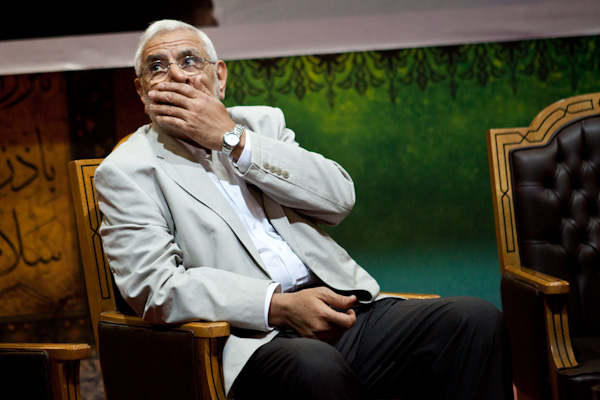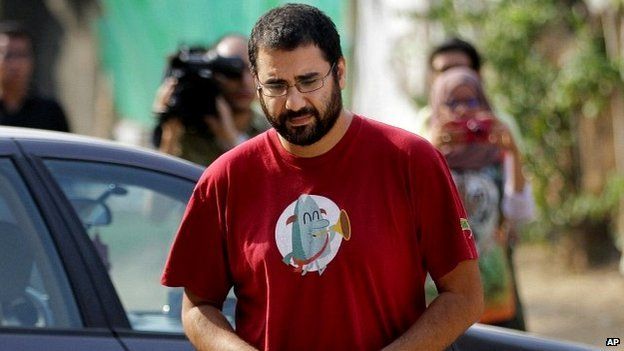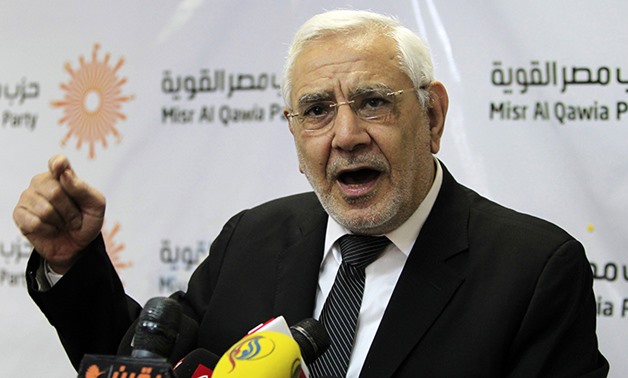After the expulsion of three major candidates from the presidential race, Abdel Moneim Abouel Fotouh has found himself as one of the leading contenders, due to his crossover appeal that could draw supporters from the expelled Islamist candidates.
Yet as a former member of the Muslim Brotherhood, it is not just with the Islamist vote that Abouel Fotouh will rely on. He is also supported by some liberal voters for his moderate positions and his insistence on citizenship and equal rights. Additionally, as a supporter of the 25 January uprising, he is not considered a supporter of the previous regime, unlike some other candidates. A recent poll conducted for Al-Masry Al-Youm gave Abouel Fotouh 15 percent of the vote — higher than any other candidate.
Abouel Fotouh announced his presidential platform and spoke about it at length during a sit-down with journalists earlier this month. He has based his platform on four main pillars: strong political leadership that puts the country’s interests first, citizenship and personal freedoms, economic revival based on scientific research and health care, and openness to the world based on Egypt’s position as a pivotal country.
But even on more controversial topics, Abouel Fotouh seems to have a clear stance where other candidates are more equivocal.
Military
Part of Abouel Fotouh’s campaign calls for one state budget, which means that the military budget — which has always been separate and secret — would be included within the state budget.
“This doesn’t mean we want to infringe on the workings of the military,” he said. “Egyptians want a strong military and we must respond to that. It is a procedural matter to have a unified budget to help streamline performance. We have great confidence in the military; it is a professional and patriotic outfit, not an army of militias.”
However, he added, “We are against the military having any role outside its duty of securing the safety of the country. That doesn’t mean isolating the military from politics, which is what Mubarak did by not sounding them out on political matters. There’s a difference between the military having a political opinion and forcing this opinion.” Many analysts and observers speculate that the military, which has ruled the country since Mubarak stepped down last February, will attempt to maintain a strong political role after the transfer of power to a civilian president.
Abouel Fotouh also suggested that he is willing to take on the military’s economic power, which some estimate accounts for up to 40 percent of GDP. “No one’s against the military having economic activities, but to serve itself only, not to compete with the private and public sector. The military having institutions to serve its needs is something that exists all over the world,” he said.
Security
Abouel Fotouh said that if he wins the presidency, his priority in the first one hundred days is to restore security, first to reassure citizens and also to promote foreign investment. In this week’s poll for Al-Masry Al-Youm, a majority of potential voters said that security was the most important issue for them.
He also has a medium-term plan to restructure the Interior Ministry. “The police force must only be that, liberated from other activities such as passport control and traffic duties. Their job is to combat crime.”
Part of this plan is also disbanding the Egyptian Police College, and making do with the Police Academy only, so graduates of other universities can join the academy for six months to become officers. According to the candidate, the goal is to “produce a civilian police officer, not a military one, because we don’t need that. The system thus far produces a combat police officer, but who will he combat? The people? We have a military that is combat-trained to protect the country.”
Abouel Fotouh wants to change the police culture so that officers are there to serve the people, like a doctor serves his patients. He also said that the Central Security Forces should be returned to the military (as they are conscripts) and should serve only as an emergency body in case of natural or manmade disasters.
Regarding the emergency law, which has been in place for most of the past 30 years, Abouel Fotouh said, “it was abused under the previous regime. Every country has an emergency law but here it was in place without a reason. It is enforced if there is a catastrophe or a war but due to the corruption of the previous regime it was used to crack down on dissent. There is no reason to enforce emergency law.”
He also said that, “the right of peaceful protest is a gain of the January revolution and cannot be taken away, which is fine long as there are no attacks on buildings or obstruction of traffic.”
Economy
Like all major Islamists in Egypt, whether parties or individuals, Abouel Fotouh is a proponent of free market economics. He condemned strongly the corruption of the businessmen affiliated with the previous regime but spoke of a “patriotic capitalism.” While paying lip service to social justice — a demand of the January uprising — it was evident that he would pursue free market policies, but with the aim of stemming “corruption and mismanagement” within that system.
An example of this that he mentioned were the thousands of consultants employed by various government institutions for exorbitant fees as they were not subject to the regulations of the state economy.
He seemed amenable to accepting the controversial IMF loan if it would remove the country from an economic “bottleneck,” but wanted to reduce dependence on loans and the “culture of debt.” Abouel Fotouh also intends to remove subsidies on energy-intensive industries and bring “private funds” into the state budget, two measures also propagated by the current cabinet of Prime Minister Kamal al-Ganzouri.



